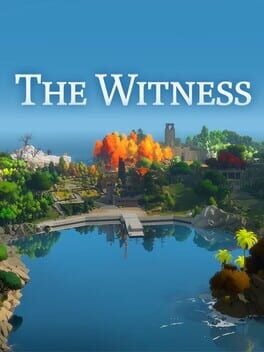If there's one thing creator Jonathan Blow is good at, it's rubbing gamers up the wrong way. It's quite evident he's an intellectual, and boy does he want you to know it.
At the heart of his games are some impeccably crafted puzzles - a simple mechanic that builds and builds to baffling, but logical, levels of complexity.
His previous title, Braid, made inventive use of time manipulation and platforming. It had at least the pretense of a comprehensible narrative, as well as a 'fun' painterly art style.
Years in the making, The Witness feels colder in every way. Between bouts of walking around an island reminiscent of Proteus or something made in Dreams, you spend most of your time on grid sheets, connecting the dots - although only in the literal sense, as any notion of a story is deeply muddled.
The puzzles soon become vastly complex, often to the point of alienating the player with a lack of guidance. No one would blame you for digging up the walkthrough every now and then, but it seems to be a game designed to leave for a while and then revisit over several months.
Vague and frustrating as it is, all the way to the end, the game keeps you coming back. The most intriguing feature is arguably the way the island's strange geography and shape reveal new puzzles, alongside some thought provoking imagery found in reflections, shadows and pathways - there's the sense that Blow has meticulously crafted the island with similar precision to Kubrick's Overlook Hotel in The Shining, to almost the same subliminal effect.
Overall, The Witness seems to walk a thin line between a decent puzzle game and a confrontational piece of interactive art. I would say that Braid is more successful as the former; and while I'm not in a rush to declare this game the latter, some of its puzzles have had a lasting effect. I sometimes lay in my bed, still trying to draw those lines in my head.
At the heart of his games are some impeccably crafted puzzles - a simple mechanic that builds and builds to baffling, but logical, levels of complexity.
His previous title, Braid, made inventive use of time manipulation and platforming. It had at least the pretense of a comprehensible narrative, as well as a 'fun' painterly art style.
Years in the making, The Witness feels colder in every way. Between bouts of walking around an island reminiscent of Proteus or something made in Dreams, you spend most of your time on grid sheets, connecting the dots - although only in the literal sense, as any notion of a story is deeply muddled.
The puzzles soon become vastly complex, often to the point of alienating the player with a lack of guidance. No one would blame you for digging up the walkthrough every now and then, but it seems to be a game designed to leave for a while and then revisit over several months.
Vague and frustrating as it is, all the way to the end, the game keeps you coming back. The most intriguing feature is arguably the way the island's strange geography and shape reveal new puzzles, alongside some thought provoking imagery found in reflections, shadows and pathways - there's the sense that Blow has meticulously crafted the island with similar precision to Kubrick's Overlook Hotel in The Shining, to almost the same subliminal effect.
Overall, The Witness seems to walk a thin line between a decent puzzle game and a confrontational piece of interactive art. I would say that Braid is more successful as the former; and while I'm not in a rush to declare this game the latter, some of its puzzles have had a lasting effect. I sometimes lay in my bed, still trying to draw those lines in my head.
2 Comments
<3

middleman6251
2 years ago